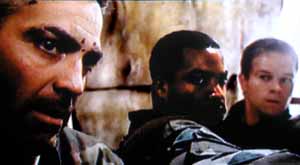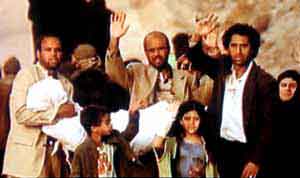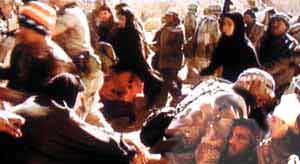JUMP
CUT
A
REVIEW OF CONTEMPORARY MEDIA


Three Kings and the neocolonial imagination in film. Here, the common framing of heroic U.S. combat with a flag in the image establishes an “American” point of view.


Three Kings’ U.S. soldier heroes provide numerous points of identification for viewers. Low angle shot here emphasizes male muscular strength and purpose. These protagonists early on refuse to follow the orders of their superior officers. Their characterization thus exemplifies the theme of the outlaw hero.


The U.S. soldiers grow morally through a change of heart. Instead of stealing gold, their original goal, they save Iraqi civilians. This plot twist builds into the script a humanist, non-oppositional critique of the Gulf War.


The film provides a happy ending for several dozen Iraqis, who escape thanks to the film’s U.S. soldier- heroes. In symbolic terms, the ending, here “native” jubilation upon rescue, parallels the United States’ “neo-colonial mission.” That is, the film personalizes an intervention in the affairs of a colonized nation by using the logic of the colonizer to attempt to solve the problems of the colonized.


The U.S. army tries to prevent George Clooney (lower right) and the other protagonists from rescuing the Iraqi civilians. The soldier-heroes see the flaws in their officers and in the U.S. mission insofar as it failed to save Iraq by destroying the “bad” Arabs, that is, Saddam Hussein’s regime.
Three Kings: neocolonial Arab representation
by Lila Kitaeff
Colonialism
may be officially over, but its ghost lives on in U.S. political actions
and cultural productions. This country’s administration has taken
on as its “righteous duty” to intervene in other countries’
governments and policies. Such international intervention is, in fact,
a less conscious governmental proclamation of an older colonial ideology,
“the white man’s burden.” This ever present colonial
ideal is not only a national governmental stance but is echoed in and
validated by popular media.
One of the most consistently misunderstood and misrepresented peoples
in the eyes of many Americans are members of the Arabic nations, a fact
made painfully clear since September 2001. Popular media representations
of Arabs have long been limited to simplistic narratives about good and
evil characters, both desperately in need of U.S. intervention either
in the form of aid or destruction. As Edward Saïd, a leading Palestinian-Western
scholar puts it:
The last permissible racism here [in the United States]—and by permissible, I mean it’s okay publicly in the media and elsewhere—is to be racist against Arabs. You can say the most outrageous things in the most respectable magazines and newspapers and even on the air about Arabs, things you would never dare to say about any other ethnic or racial group. (Viswanathan 320)
My use of
the term “Arab” in this paper should be understood to refer
to Arabic-speaking people and/or people tracing their heritage to an Arabic
nation in the Middle East or North Africa. The League of Arab States currently
includes Egypt, Syria, Lebanon, Jordan, Iraq, Saudi Arabia, Yemen, the
Palestinian Territories, Algeria, Bahrain, Djibouti, Eritrea, Kuwait,
Libya, Mauritania, Morocco, Oman, Qatar, Somalia, Sudan, Tunisia, and
the United Arab Emirates. Arabs are not a race, and they do not all share
the same religion or political beliefs. However, it should be noted that
people from other parts of the Middle East and/or those of the Muslim
faith are often falsely identified as Arabs within the United States.
The Arab American Institute notes,
In both popular culture and government policy, anti-Arab stereotypes since the 1970’s have affixed a stigma on Arab ethnicity in America… The Arab as villain has been a favorite scape-goat of American culture (par. 11).
In the 1980s and 90s the stereotype of Arab terrorists as generic “bad guys” rose to prominence in films starring Arnold Schwarzenegger, such as Commando and True Lies. Many people in the United States have had only this kind of Arabic image readily at hand. The cultural association is so strong that the Oklahoma City bombing of 1995 was immediately blamed on Arabic groups based on no other evidence than the stereotype of Arab as terrorist. Even reputable newspapers and magazines have done little to improve the image of Arabs since the press often focuses on the mysterious nature of Arab peoples and the chaos and evil of Arab governments (Saïd in Viswanathan 295-296).
In the past,
this view of the Arabic world as a dark and mysterious place has supported
U.S. political and military intervention in the Mideast and Africa, either
through direct U.S. military campaigns or its political and economic support
of such campaigns; we have seen military action that the U.S. supported
in recent times in Iraq, Somalia, and the Palestinian territories. Today
we see the continuation of these governmental efforts in many of its actions
and, ideologically, in the way it represents “the war on terrorism.”
Now, with striking contemporary resonances, the Persian Gulf War of 1991
stands as a defining moment when both the U.S. government and many political
commentators relied on Arab stereotypes to justify an unjustifiable war
to the nation.
Today, since under the leadership of another President Bush, we have again
attacked Iraq, this situation should prompt us to take another look at
the first Gulf war, from which our current attack descends. At the time
of this writing, late March 2003, the United States has been at war with
Iraq for one week, after having threatened attack for several months.
Unsupported by the majority of the world’s nations, including many
citizens of the United States who have taken to the streets in massive
protests, President Bush used war powers granted to him by the United
States Congress. Bombing and ground fighting have taken place throughout
the country of Iraq, the oilfields in the South have been “secured,”
and U.S. and British troops are on their way to begin fighting in Baghdad.
So far, the expected uprising against Saddam Hussein in Southern Iraq has
not taken place and Iraqi resistance has been greater than the U.S. had
claimed it would be, leaving no doubt that the war will be longer and
bloodier than previously imagined. However, Bush insists that the United
States will “fight for as long as it takes” to remove Hussein
from power and liberate the Iraqi people.
The
Gulf War on film
Three Kings (Dir. David O. Russell, 1999) is a complex film exploring
the ramifications of the 1991 Persian Gulf War. It is a cultural production
that self-consciously attempts to move away from these mainstream views
of Arabs I discuss above. However, it still remains marked by colonial
ideology. In my analysis, I will locate the film in a tradition of neocolonialism,
one that separates the colonizer and the colonized into categories of
identification centered around “self” and “other.”
In film, these categories are created specifically through the cinematic
apparatus. That is, Hollywood film “interpellates” its viewers,
or encourages their identification with characters, by creating various
“spectator positions.” These spectator positions are established
not only by the storyline and the action, but also by the visual trajectory
of the film, which proceeds in time through the main characters’
points of view and the narrative goal that the script sets up for the
protagonists to reach. In this case, the narrative goal is what Ella Shohat
and Robert Stam would call their “neocolonial mission.” The
“neocolonial mission,” as I will explore further below, is
to intervene in the affairs of colonized nations, to use the logic of
the colonizer to attempt to solve the problems of the colonized.
In Three Kings, viewer positions are set up to create a sense
of identification (the viewer’s feeling a sense of “self”—
I’m briefly in that person’s shoes) or to see characters or
situations as safely “other.” Interestingly, such identification
processes set up by the film are complicated by the tenuous scripting
of a major black American character, who partially elicits spectatorial
identification but in the narrative is simultaneously relegated to the
category of other. Most important, the film’s very critique of U.S.
military intervention in the Persian Gulf War ultimately remains limited
to expression in neocolonial terms, and any critique is further undermined
by the film’s use of mainstream U.S. cultural and cinematic themes.
Neocolonialism persists as an ideology and an economic practice that continues
to enact and reinforce many of the tenets of colonialism. Ella Shohat
and Robert Stam define neocolonialism as follows:
Although direct colonial rule has largely come to an end, much of the world remains entangled in neocolonialism … a conjuncture in which direct political and military control has given way to abstract, semi-indirect, largely economic [and cultural] forms of control. (17)
Shohat and
Stam argue that as projects, cinema and imperialism have always been tied
together since cinema’s origins. They further demonstrate how a
submerged colonial presence exists in many contemporary films (100-131).
In particular, like Three Kings, many films set in the Mideast,
Africa, and Asia, often continue the colonial project into our neocolonial
era.
Three Kings takes place just as the Gulf War has ended. The film
centers around four U.S. soldiers—played by Spike Jonze, Mark
Wahlberg, Ice Cube, and George Clooney—who find a map leading
to Saddam Hussein’s hidden gold. During their search for the gold,
the U.S. soldiers stumble upon a bunker holding Iraqi civilian prisoners.
The four soldiers then shift the focus of their mission to rescue the
prisoners, making their way to the Iranian border with Iraqi soldiers
in pursuit. The U.S. army attempts to stop them, allowing the civilians
to escape across the border only after Clooney’s character gives
up the gold to his superiors.
Three
Kings is a remake of a WWII film, Kelly’s Heroes (dir. Brian
G. Hutton, 1970). The original film starred Clint Eastwood as the leader
of a group of U.S. soldiers in France who defied their superiors’
orders in order to steal a stash of Nazi gold hidden behind enemy lines.
While hailed as a successful comic antiwar film, Kelly’s Heroes
lacked the moral twist of Russell’s film. Interestingly, even though
remakes are currently big business in Hollywood, Three Kings’
connection to its predecessor was barely mentioned in current marketing
or critical reviews.
Non-oppositional
critique
of the Gulf War
In general,
Three Kings’ marketing and reception dwelt on its supposedly
unconventional nature. By unconventional, I mean “oppositional”
discourse and imagery in the sense of contrasting to those found in dominant
cultural productions. Although I will argue that the film does not, in
fact, deviate from a typical Hollywood film in its basic message and structure,
Three Kings does occupy a somewhat tenuous position in terms
of Hollywood-type unconventionality. At first glance, viewers might expect
the film to be an action-packed adventure and war movie. The main actors
are blockbuster action stars (with the exception of Spike Jonze, director
of Being John Malkovich and several “Beastie Boys”
videos). And director Russell’s previous films, Spanking the
Monkey and Flirting with Disaster, were offbeat in their
brand of dark comedy, if not particularly unconventional in form or plot.
Initially film reviewers considered the story original. They said this
film had more to it than met the eye, that its message and structure differed
from most Hollywood films. A typical review praised Three Kings
for its “genre subversion, anarchic attitude and barbed political
commentary… making cogent points about… America’s role
as the world’s policeman.” This same reviewer even suggested
that the film addressed “the amorality and lack of consistent principles
in American foreign policy. No Hollywood film in memory has addressed
such an issue” (McCarthy par. 4 and 18).
However, although Russell does make a certain social critique of the Gulf
War, as I will explore below, it is based in mainstream rather than oppositional
discourses. For example, he explained this as his goal:
Taking people’s perceptions of this war, and turning them on their head… all the assumptions that you had about this war need to be looked at and turned over, including the sense of satisfaction you had as a moral victor, as an American.
However,
if one were to make an explanatory critique subverting mainstream perceptions
of the Gulf War, one would have to take into account the struggle’s
historical context and the economic and ideological interests behind U.S.
intervention. Such an argument was made by Noam Chomsky and Michael Albert,
for example, when they asserted that “the real reason for U.S. opposition
to Iraqi occupation of Kuwait is… to keep Washington, Wall Street,
and their allies in charge of setting oil prices” (par. 5). And
as Chomsky and Albert further pointed out, the U.S. government also has
an ideological interest in perpetuating militarism in order to maintain
the status quo of military spending and interventionist foreign policy.
Three Kings does not offer this sort of explanatory critique.
Instead, the film presents the protagonists as coming to a realization
that the United States has failed to save Iraq and destroy Hussein’s
regime. According to the film, the United States is mistaken not because
it intervened in the Middle East but rather because it did not follow
through in its mission to save the good Arabs and crush the bad Arabs,
a mission perpetuating neocolonial ideals. The heroes of Three Kings,
in terms of the film’s logic, right the wrongs of the United States
by saving a small group of Iraqi civilians, thus reproducing “the
[neo]colonialist structure of the heroes’ relation to the native…
[to] sort out the problems of people who cannot sort things out for themselves”
(Dyer 156).